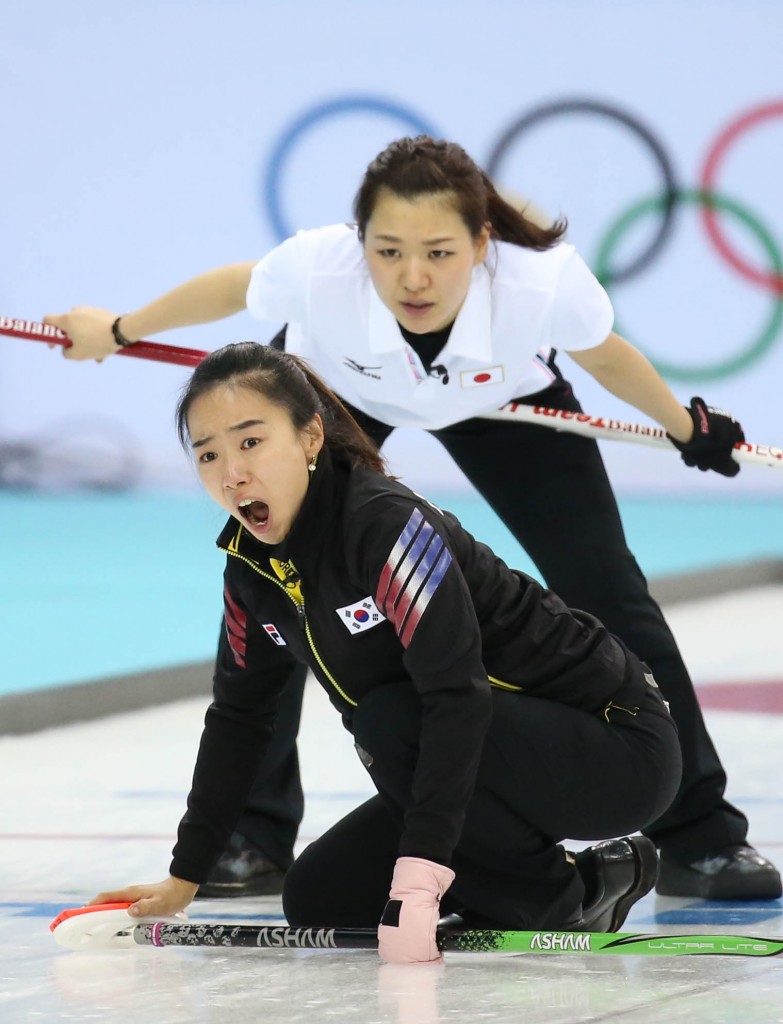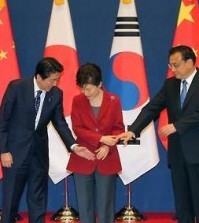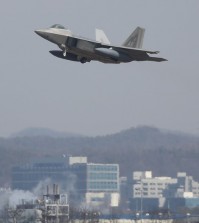- California Assembly OKs highest minimum wage in nation
- S. Korea unveils first graphic cigarette warnings
- US joins with South Korea, Japan in bid to deter North Korea
- LPGA golfer Chun In-gee finally back in action
- S. Korea won’t be top seed in final World Cup qualification round
- US men’s soccer misses 2nd straight Olympics
- US back on track in qualifying with 4-0 win over Guatemala
- High-intensity workout injuries spawn cottage industry
- CDC expands range of Zika mosquitoes into parts of Northeast
- Who knew? ‘The Walking Dead’ is helping families connect
Korea registers first-ever Olympic Curling win
Defeats Japan 12-7, then loses to Swiss 6-8

South Korea’s skip Kim Jisun, front, yells during the women’s curling competition against Japan at the 2014 Winter Olympics, Tuesday, Feb. 11, 2014. (Yonhap)
Korea defeated Japan 12-7 in its opening round robin match of women’s curling at the Sochi Olympics on Tuesday.
It was Korea’s first-ever Curling win in Olympics, but they couldn’t make it two in-a-row as they fell to Switzerland 6-8 later in the day.
The Korean women’s team, which is participating in the curling event at the Sochi Olympic Games for the first time, isn’t expected to reach the podium. However, they hope to repeat their startling performance at the 2012 world championships, where they pulled off the biggest upset of the event. Korea beat Vancouver Olympic champion nation Sweden 9 to 8 and made it to the playoffs, in which they settled for fourth place.
They’re determined to show the world that their recent success shouldn’t be chalked up to luck. “We’re facing many difficulties but we’re preparing for the upcoming competitions with confidence and vigor,” said team captain Kim Ji-sun. “We’re going to engage ourselves confidently, but with the mindset that we are still an underdog with nothing to lose.”
Comprised of Captain Kim, Gim Un-chi, Shin Mi-sung, Lee Seul-bee and Um Ji-min, Team Korea came from behind to defeat Japan in session two of the round robin at the Ice Cube Curling Center.
Korea started off 0-2 down in the first end, and the score went back and forth until the eighth end, when Team Korea took the lead. It then widened the gap and maintained it to the end.
The team will face Switzerland in round robin session three, then Sweden in session four. In session six, Korea will meet Russia; in session eight, Great Britain; and in session 10, Denmark. In session 11, Korea will battle the United States and finally in session 12, curling medal contender Canada.
Curling is played on a long sheet of ice with two “houses” at either end. Two teams of four take turns sliding polished granite stones, also called rocks, toward the house, a circular target consisting of three concentric rings distinguished by color.
Scores are higher as the stones rest closer to the center of the house, also known as the button. There are 10 periods, or ends, and each team member gets two tries per end. Only one team can score per end — the team with the stone closest to the button scores as many stones there are closer to the button than the opponents’ most successful.
Two additional elements make the game more interesting. Athletes must keep in mind that their stone could be taken out so hitting the button early on in the game is not necessarily a good shot. Then there’s the sweeping.
After the stone is delivered, two sweepers join it as it slides towards the house, and with brooms they essentially sweep the ice to influence the stone’s direction and distance. As silly as it looks, the sweeping requires strategy and teamwork and so the sport is nicknamed “chess on ice.” All the while, the skip, or the captain, yells instructions to the sweepers.
Though curling was invented in Scotland, it is widely popular in Canada, which won the gold at the 1988 Nagano Games. This was when curling was made an official Olympic sport, though critics argue whether it really is a sport. Until then, it was a demonstration event, played only for promotion.
The Canadian women’s team has made it to the podium at every Olympics since the Nagano Games but this year, Sweden is expected to challenge them. The Canadian men’s team hopes to snag its third consecutive gold medal.















